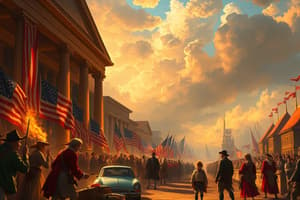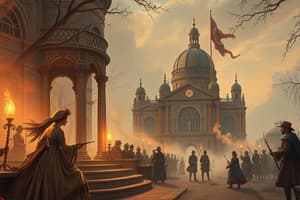Podcast
Questions and Answers
Which list of events is in correct chronological order?
Which list of events is in correct chronological order?
- Stamp Act, Townshend Act, Tea Act (correct)
- Tea Act, Townshend Act, Stamp Act
- Townshend Act, Stamp Act, Tea Act
- Tea Act, Stamp Act, Townshend Act
Imperial wars were fought in North America during the 17th & 18th centuries between which two mercantile rivals?
Imperial wars were fought in North America during the 17th & 18th centuries between which two mercantile rivals?
Great Britain and France
With what idea would President George Washington most strongly oppose (based on ideas in his farewell address)?
With what idea would President George Washington most strongly oppose (based on ideas in his farewell address)?
Entering into treaties with foreign nations to help expand America's influence
Colonial opposition and protest to the Stamp Act resulted in which of the following?
Colonial opposition and protest to the Stamp Act resulted in which of the following?
What two groups clashed at the Constitutional Convention but then found agreement in the Great (or Connecticut) Compromise?
What two groups clashed at the Constitutional Convention but then found agreement in the Great (or Connecticut) Compromise?
Which policy would Alexander Hamilton have supported?
Which policy would Alexander Hamilton have supported?
What question did the Land Ordinance of 1785 answer?
What question did the Land Ordinance of 1785 answer?
What was the first tax that led to widespread united opposition in the British colonies?
What was the first tax that led to widespread united opposition in the British colonies?
What led most directly to Parliament's passing laws the colonists called the Intolerable Acts?
What led most directly to Parliament's passing laws the colonists called the Intolerable Acts?
What advice did George Washington give in his farewell address?
What advice did George Washington give in his farewell address?
What was the significance of the Whiskey Rebellion?
What was the significance of the Whiskey Rebellion?
James Madison's Virginia Plan answered which question?
James Madison's Virginia Plan answered which question?
What rule did Parliament adopt in the Declaratory Act?
What rule did Parliament adopt in the Declaratory Act?
Which tax crisis led most directly to America's declaring its independence from Great Britain?
Which tax crisis led most directly to America's declaring its independence from Great Britain?
What advice did George Washington give in his farewell address?
What advice did George Washington give in his farewell address?
Colonial opposition and protest to the Stamp Act resulted in which of the following?
Colonial opposition and protest to the Stamp Act resulted in which of the following?
Movements like the Sons and Daughters of Liberty developed to protest which of the following?
Movements like the Sons and Daughters of Liberty developed to protest which of the following?
British troops were sent to Boston to put down colonial protests to which of the following?
British troops were sent to Boston to put down colonial protests to which of the following?
A belief in which of the following united members of the Federalist Party and its leaders like Alexander Hamilton?
A belief in which of the following united members of the Federalist Party and its leaders like Alexander Hamilton?
Which of the following most accurately explains 'Republican Motherhood'?
Which of the following most accurately explains 'Republican Motherhood'?
What issue united Quakers and residents of Vermont?
What issue united Quakers and residents of Vermont?
What was the most direct cause of the Boston Massacre?
What was the most direct cause of the Boston Massacre?
Which statement about competition during the first political party is most correct?
Which statement about competition during the first political party is most correct?
What was a major cause of the imperial wars fought in North America between France and Great Britain in the late 17th and 18th centuries?
What was a major cause of the imperial wars fought in North America between France and Great Britain in the late 17th and 18th centuries?
Flashcards are hidden until you start studying
Study Notes
Chronological Events
- Key events in colonial American history include the Stamp Act, followed by the Townshend Act, and culminating in the Tea Act.
Mercantile Rivals
- The primary imperial wars in North America during the 17th and 18th centuries were fought between Great Britain and France.
Washington's Foreign Policy
- George Washington strongly opposed entering treaties with foreign nations aimed at expanding America's influence.
Stamp Act Protests
- The colonial opposition to the Stamp Act successfully led to its repeal, showcasing the effectiveness of collective protest.
Constitutional Compromise
- At the Constitutional Convention, large states and small states initially clashed but eventually reached an agreement through the Great (Connecticut) Compromise.
Hamilton's Economic Policy
- Alexander Hamilton advocated for a high protective tariff as part of his economic policies to nurture American industries.
Land Ordinance of 1785
- The Land Ordinance of 1785 addressed the question of selling land to generate revenue for paying off national debt.
Initial Tax Resistance
- The Stamp Act was the first tax that incited widespread opposition among British colonies, marking a pivotal moment in American resistance.
Intolerable Acts Trigger
- The Boston Tea Party directly led to Parliament’s enactment of the laws known as the Intolerable Acts, intensifying colonial unrest.
Washington's Advisory on Political Divisions
- In his farewell address, George Washington warned against the rise of political parties and favored an independent foreign policy without foreign alliances.
Whiskey Rebellion Significance
- The Whiskey Rebellion illustrated that acts of protest would not be tolerated and would be suppressed by the federal government.
Virginia Plan and Tyranny
- James Madison's Virginia Plan sought to answer how to effectively divide power within a national government to prevent tyranny.
Declaratory Act Rule
- The Declaratory Act established that Parliament maintained the authority to legislate for its colonies "in all cases whatsoever."
Independence Catalyst
- The Tea Act was the tax crisis that most directly incited America’s declaration of independence from Great Britain.
Republican Motherhood Concept
- 'Republican motherhood' emphasized the role of women in raising virtuous and industrious children to build a strong republic.
Quaker and Vermont Solidarity
- Quakers and Vermont residents found common ground in their opposition to slavery, highlighting early abolitionist sentiments.
Boston Massacre Root Cause
- The Townshend Act was the most direct cause of the Boston Massacre, reflecting colonial tensions with British authority.
Early Political Competition
- The first political party competition was between the Federalists, who favored a strong national government, and the Republicans, led by Thomas Jefferson, who drew support from farmers.
Imperial Wars Drivers
- The competition for natural resources was a major factor fueling the imperial wars between France and Great Britain in North America during the late 17th and 18th centuries.
Studying That Suits You
Use AI to generate personalized quizzes and flashcards to suit your learning preferences.




